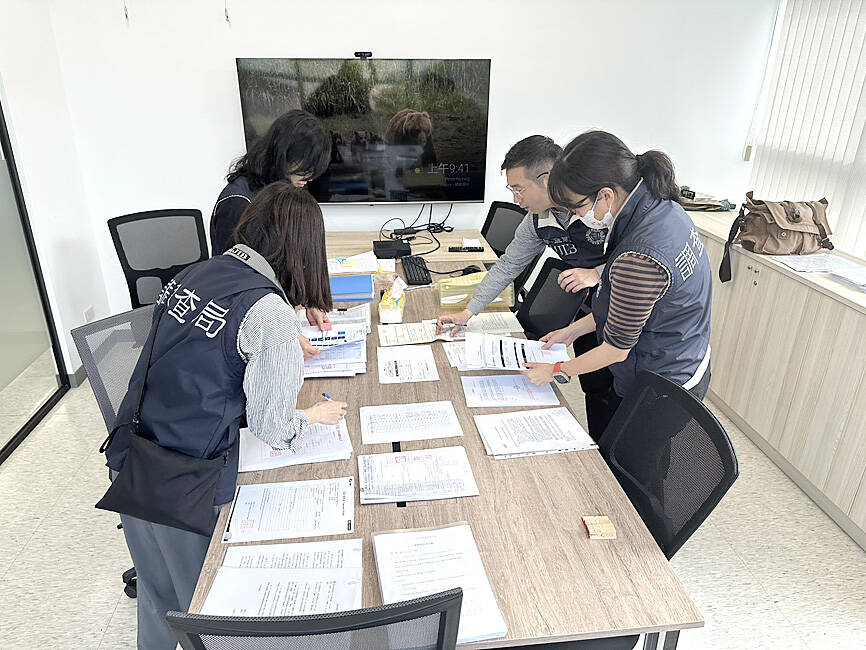The Ministry of Justice Investigation Bureau is investigating whether China’s leading chipmaker Semiconductor Manufacturing International Corp (SMIC, 中芯) illegally poached local engineers as part of an effort to access Taiwan’s cutting-edge chip technology.
SMIC set up a branch in Taiwan posing as a Samoa-based company and tried to hire local talent, prosecutors from the bureau said in a statement yesterday.
Local investigators this month raided 34 locations and questioned 90 people as part of a large-scale probe into 11 Chinese technology companies, including SMIC, the bureau said.

Photo courtesy of the Ministry of Justice Investigation Bureau
A SMIC representative did not respond to requests for comment.
SMIC rose to global fame in 2023 when it worked with Huawei Technologies Co (華為) to produce an advanced 7-nanometer chip despite facing a myriad of US-led curbs that continue to prevent Chinese companies from securing the most advanced chipmaking equipment.
However, the two companies have now hit a snag with technology development as they cannot secure ASML Holding NV’s extreme ultraviolet lithography systems required to make the most cutting-edge chips.
As China faces growing restrictions on its access to advanced foreign technologies, it has aggressively tried to obtain know-how in cutting-edge segments including semiconductors by ramping up efforts to recruit engineers from Taiwan and elsewhere.
Taiwan has become a favorite talent farm for China as the two sides share the same language, and Taiwan has the best chipmaking technologies in the world.
Taiwan Semiconductor Manufacturing Co (台積電) is the go-to chipmaker for Apple Inc and Nvidia Corp, producing the majority of the world’s artificial intelligence accelerators.
Taiwan does not allow Chinese companies to conduct business activities including hiring locally without formal government approval. However, there have been many cases of Chinese technology companies setting up operations in Taiwan and posing as foreign or local firms.
The bureau said it has opened more than 100 investigations into Chinese companies illegally hiring Taiwanese engineers since it formed a task force for such probes in 2020.

CHAOS: Iranians took to the streets playing celebratory music after reports of Khamenei’s death on Saturday, while mourners also gathered in Tehran yesterday Iranian Supreme Leader Ayatollah Ali Khamenei was killed in a major attack on Iran launched by Israel and the US, throwing the future of the Islamic republic into doubt and raising the risk of regional instability. Iranian state television and the state-run IRNA news agency announced the 86-year-old’s death early yesterday. US President Donald Trump said it gave Iranians their “greatest chance” to “take back” their country. The announcements came after a joint US and Israeli aerial bombardment that targeted Iranian military and governmental sites. Trump said the “heavy and pinpoint bombing” would continue through the week or as long

TRUST: The KMT said it respected the US’ timing and considerations, and hoped it would continue to honor its commitments to helping Taiwan bolster its defenses and deterrence US President Donald Trump is delaying a multibillion-dollar arms sale to Taiwan to ensure his visit to Beijing is successful, a New York Times report said. The weapons sales package has stalled in the US Department of State, the report said, citing US officials it did not identify. The White House has told agencies not to push forward ahead of Trump’s meeting with Chinese President Xi Jinping (習近平), it said. The two last month held a phone call to discuss trade and geopolitical flashpoints ahead of the summit. Xi raised the Taiwan issue and urged the US to handle arms sales to

BIG SPENDERS: Foreign investors bought the most Taiwan equities since 2005, signaling confidence that an AI boom would continue to benefit chipmakers Taiwan Semiconductor Manufacturing Co’s (TSMC, 台積電) market capitalization swelled to US$2 trillion for the first time following a 4.25 percent rally in its American depositary receipts (ADR) overnight, putting the world’s biggest contract chipmaker sixth on the list of the world’s biggest companies by market capitalization, just behind Amazon.com Inc. The site CompaniesMarketcap.com ranked TSMC ahead of Saudi Aramco and Meta Platforms Inc. The Taiwanese company’s ADRs on Tuesday surged to US$385.75 on the New York Stock Exchange, as strong demand for artificial intelligence (AI) applications led to chip supply constraints and boost revenue growth to record-breaking levels. Each TSMC ADR represents

Pro-democracy media tycoon Jimmy Lai’s (黎智英) fraud conviction and prison sentence were yesterday overturned by a Hong Kong court, in a surprise legal decision that comes soon after Lai was jailed for 20 years on a separate national security charge. Judges Jeremy Poon (潘兆初), Anthea Pang (彭寶琴) and Derek Pang (彭偉昌) said in the judgement that they allowed the appeal from Lai, and another defendant in the case, to proceed, as a lower court judge had “erred.” “The Court of Appeal gave them leave to appeal against their conviction, allowed their appeals, quashed the convictions and set aside the sentences,” the judges